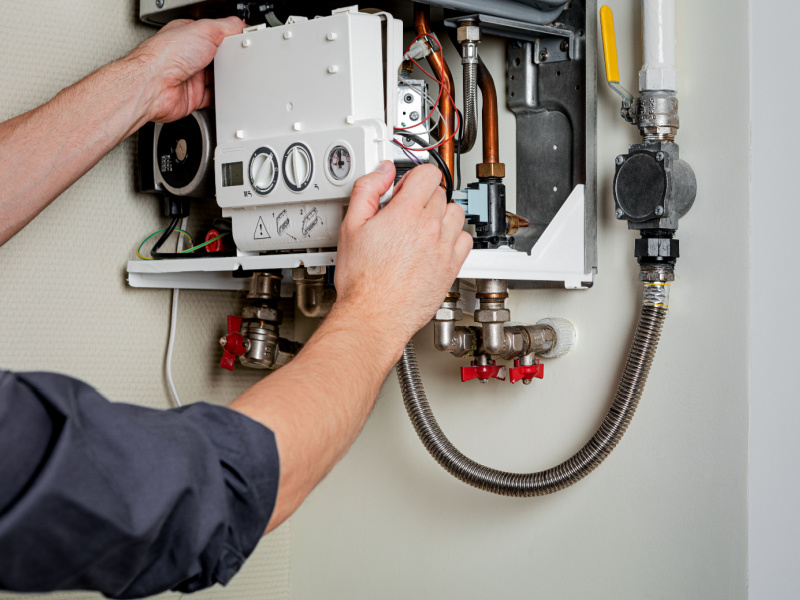What You Need to Know About the Future of Gas Boilers in UK Properties
If you own a property or are considering upgrading your heating system, it’s essential to understand the ongoing changes in UK policy, the impact of gas boilers, and why a ban is looming.

With increasingly long and cold winters in the UK and rising energy costs, how to keep our homes warm is a continued concern for people up and down the country. Traditionally most properties have gas heating systems installed to keep the home nice and warm. But this method contributes to a rise in carbon emissions and harms the environment.
The heating of homes accounts for a substantial portion of the UK’s overall carbon footprint. Gas boilers are a significant contributor. What are we doing about this?
As the country transitions to a low-carbon future, essential changes are on the horizon, particularly regarding the use of gas in domestic properties. With increasing concerns about climate change and the UK government’s commitment to achieving net-zero carbon emissions by 2050, the future of gas boilers and home heating systems is under scrutiny.
The Urgent Gas Boiler Ban:
The UK government has planned the whole way towards greener heating solutions. This phase-out has been divided into three segments.
Immediate Impact on New Builds from 2025: Gas boilers are now banned in new-build homes as part of the government’s “Future Homes Standard.” This means constructed homes must use low-carbon heating systems instead of traditional gas boilers. The Future Homes Standard mandates that new homes be more energy-efficient, reducing their carbon footprint from the outset.
Gradual Impact on Existing Properties: The phase-out of gas boilers in existing homes will be more gradual. While there is no immediate ban on replacing gas boilers in existing homes, homeowners are encouraged to consider low-carbon alternatives when upgrading their heating systems. The government has also indicated that it aims to completely phase out the installation of new gas boilers by 2035. Homeowners can thus plan for future changes. It does indicate the days of gas boilers in the UK are numbered.
A Financial Incentive – Boiler Upgrade Scheme (BUS): To support the transition from gas boilers, the UK government has introduced the Boiler Upgrade Scheme (BUS), which provides financial incentives for homeowners to replace old gas boilers with low-carbon alternatives. These grants help reduce the upfront costs of switching to a more sustainable heating system, providing homeowners with some financial support to make the switch more affordable.
Challenges of Phasing Out Gas Boilers
One of the main obstacles is the cost of upgrading to alternative systems. Low-carbon heating technologies like heat pumps and biomass boilers have higher upfront costs than traditional gas boilers. Although financial incentives like the Boiler Upgrade Scheme are available, the initial investment may still be a barrier for some homeowners. Additionally, some of the newer technologies, such as hydrogen boilers, are still in the early stages of development. There is uncertainty about when they will become widely available and affordable.
What Are the Alternatives to Gas Boilers?
As the UK government starts phasing out carbon emissions and promoting greener heating solutions, there are different solutions available. These technologies are designed to reduce or eliminate carbon emissions from heating homes and providing hot water. If you’re planning to upgrade your heating system, it’s worth exploring these options:
Heat pumps are the most efficient and popular heating system options. They work by transferring heat from the air or ground into your home, making them highly energy-efficient. Air-source heat pumps extract heat from the outside air, even at low temperatures, while ground-source heat pumps draw heat from the ground.
Hydrogen boilers are an emerging technology that could play a crucial role in the future of home heating. Unlike previous gas boilers, these hydrogen boilers don’t emit carbon in the atmosphere. However, the challenge is that these boilers are in the early stages of development, and widespread adoption may take time. The UK government is currently exploring the feasibility of using hydrogen for home heating. Trials are expected to begin in the coming years.
Biomass Boilers burn on organic materials like wood pellets or chips to produce heat. While biomass boilers still produce some CO2, the amount is significantly lower than gas boilers, and their fuel is renewable.
Solar Thermal panels use energy from the sun to heat water, which can then be used for central heating or hot water systems. While they are most effective during summer, solar thermal panels can significantly reduce reliance on gas boilers during sunnier periods.
What should the current homeowners do?
What does the ban on gas boilers mean for current homeowners? How can you navigate the change? The UK government initiated this plan with effect from 2025 but will still phase it out by 2035. It’s essential to consider your options for a more sustainable heating system. Here are a few steps you can take to prepare:
1) The first step would be to look into the age and the health of your property’s gas boiler. If it’s old enough, you might want to look into the options. Research less carbon-emitting solutions for your home heating systems.
2) The second step is to evaluate your home’s needs. What sort of heating system would help you keep your home warm in cold weather? Consider factors such as your home’s size, heating needs, and budget. Consulting with a professional heating specialist can help you determine the best solution, empowering you to make the right choice for your home.
3) If you’re thinking about upgrading your heating system, explore the government’s Boiler Upgrade Scheme and other incentives that can help offset the cost of switching to a low-carbon alternative.
In Summary…
The gas boiler ban is an excellent initiative by the UK government to reduce the carbon footprint on the environment. It is being introduced in phases to give time to plan during the phase-out without immediate stresses and urgencies.
With the introduction of the gas boiler ban, homeowners will need to start proactively exploring alternatives. Study the options for less carbon-emitting heating systems. See if any of the schemes can help make a switch to an alternative more affordable. Determine what is the best fit for your property. Whether you opt for a heat pump, biomass boiler, or another low-carbon solution, making the switch sooner rather than later will help reduce your carbon footprint and future-proof your home.
At Silver Maintenance, we are dedicated to helping you navigate these changes. We can ensure your home heating system is efficient, sustainable, and ready for the future. Contact us today to learn more about upgrading your heating system and staying ahead of the curve in the UK’s journey to a greener future!
